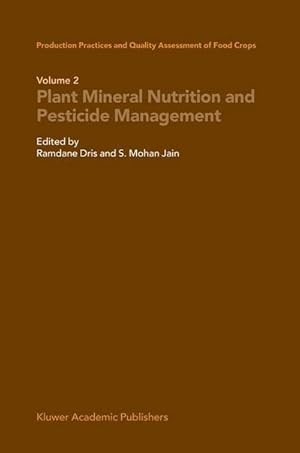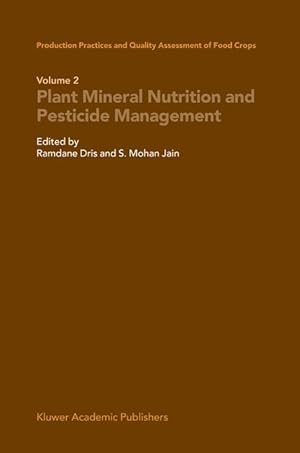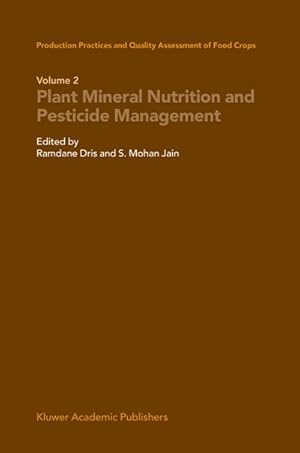9789048164592 - Production Practices and Quality Assessment of Food Crops: Plant Mineral Nutrition and Pesticide Management: 2 (7 resultados)
ComentariosFiltros de búsqueda
Tipo de artículo
- Todos los tipos de productos
- Libros (7)
- Revistas y publicaciones (No hay ningún otro resultado que coincida con este filtro.)
- Cómics (No hay ningún otro resultado que coincida con este filtro.)
- Partituras (No hay ningún otro resultado que coincida con este filtro.)
- Arte, grabados y pósters (No hay ningún otro resultado que coincida con este filtro.)
- Fotografías (No hay ningún otro resultado que coincida con este filtro.)
- Mapas (No hay ningún otro resultado que coincida con este filtro.)
- Manuscritos y coleccionismo de papel (No hay ningún otro resultado que coincida con este filtro.)
Condición Más información
- Nuevo (7)
- Como nuevo, Excelente o Muy bueno (1)
- Bueno o Aceptable (No hay ningún otro resultado que coincida con este filtro.)
- Regular o Pobre (No hay ningún otro resultado que coincida con este filtro.)
- Tal como se indica (No hay ningún otro resultado que coincida con este filtro.)
Encuadernación
- Todas
- Tapa dura (No hay ningún otro resultado que coincida con este filtro.)
- Tapa blanda (7)
Más atributos
- Primera edición (No hay ningún otro resultado que coincida con este filtro.)
- Firmado (No hay ningún otro resultado que coincida con este filtro.)
- Sobrecubierta (No hay ningún otro resultado que coincida con este filtro.)
- Con imágenes (4)
- No impresión bajo demanda (4)
Idioma (1)
Precio
- Cualquier precio
- Menos de EUR 20 (No hay ningún otro resultado que coincida con este filtro.)
- EUR 20 a EUR 45 (No hay ningún otro resultado que coincida con este filtro.)
- Más de EUR 45
Gastos de envío gratis
- Envío gratis a España (No hay ningún otro resultado que coincida con este filtro.)
Ubicación del vendedor
Valoración de los vendedores
-
Production Practices and Quality Assessment of Food Crops: Plant Mineral Nutrition and Pesticide Management
Librería: Ria Christie Collections, Uxbridge, Reino Unido
EUR 115,43
Convertir monedaEUR 5,15 gastos de envío desde Reino Unido a EspañaCantidad disponible: Más de 20 disponibles
Añadir al carritoCondición: New. In.
-
Production Practices and Quality Assessment of Food Crops : Plant Mineral Nutrition and Pesticide Management
Librería: AHA-BUCH GmbH, Einbeck, Alemania
EUR 109,94
Convertir monedaEUR 11,99 gastos de envío desde Alemania a EspañaCantidad disponible: 1 disponibles
Añadir al carritoTaschenbuch. Condición: Neu. Druck auf Anfrage Neuware - Printed after ordering - Plants require nutrients in order to grow, develop and complete their life cycle. Mineral fertilizers, and hence the fertilizer industry, constitute one of the most imp- tant keys to the world food supplies. There is growing concern about the safety and quality of food. Carbon, hydrogen and oxygen, which, together with nitrogen, form the structural matter in plants, are freely available from air and water. Nitrogen, phosphorus and potassium, on the other hand, may not be present in quantities or forms sufficient to support plant growth. In this case, the absence of these nut- ents constitutes a limiting factor. The supply of nutrients to the plants should be balanced in order to maximise the efficiency of the individual nutrients so that these meet the needs of the particular crop and soil type. For example, it should be noted that EU-wide regulations are not designed to govern the specific details of mineral fertilizer use. Although plants receive a natural supply of nitrogen, phosphorus and potassium from organic matter and soil minerals, this is not usually sufficient to satisfy the demands of crop plants. The supply of nutrients must therefore be supplemented with fertilizers, both to meet the requirements of crops during periods of plant growth and to replenish soil reserves after the crop has been harvested. Pesticides are important in modern farming and will remain indispensable for the foreseeable future.
-
Production Practices and Quality Assessment of Food Crops: Plant Mineral Nutrition and Pesticide Management: Vol 2
Librería: Revaluation Books, Exeter, Reino Unido
EUR 152,68
Convertir monedaEUR 11,48 gastos de envío desde Reino Unido a EspañaCantidad disponible: 2 disponibles
Añadir al carritoPaperback. Condición: Brand New. 288 pages. 9.20x6.00x0.66 inches. In Stock.
-
Production Practices and Quality Assessment of Food Crops: Plant Mineral Nutrition and Pesticide Management
Librería: Lucky's Textbooks, Dallas, TX, Estados Unidos de America
EUR 103,53
Convertir monedaEUR 64,74 gastos de envío desde Estados Unidos de America a EspañaCantidad disponible: Más de 20 disponibles
Añadir al carritoCondición: New.
-
Production Practices and Quality Assessment of Food Crops
Librería: moluna, Greven, Alemania
EUR 92,27
Convertir monedaEUR 19,49 gastos de envío desde Alemania a EspañaCantidad disponible: Más de 20 disponibles
Añadir al carritoCondición: New. Dieser Artikel ist ein Print on Demand Artikel und wird nach Ihrer Bestellung fuer Sie gedruckt. Plants require nutrients in order to grow, develop and complete their life cycle. Mineral fertilizers, and hence the fertilizer industry, constitute one of the most imp- tant keys to the world food supplies. There is growing concern about the safety and qua.
-
Production Practices and Quality Assessment of Food Crops
Publicado por Springer Netherlands Dez 2010, 2010
ISBN 10: 9048164591 ISBN 13: 9789048164592
Idioma: Inglés
Librería: BuchWeltWeit Ludwig Meier e.K., Bergisch Gladbach, Alemania
EUR 106,99
Convertir monedaEUR 11,00 gastos de envío desde Alemania a EspañaCantidad disponible: 2 disponibles
Añadir al carritoTaschenbuch. Condición: Neu. This item is printed on demand - it takes 3-4 days longer - Neuware -Plants require nutrients in order to grow, develop and complete their life cycle. Mineral fertilizers, and hence the fertilizer industry, constitute one of the most imp- tant keys to the world food supplies. There is growing concern about the safety and quality of food. Carbon, hydrogen and oxygen, which, together with nitrogen, form the structural matter in plants, are freely available from air and water. Nitrogen, phosphorus and potassium, on the other hand, may not be present in quantities or forms sufficient to support plant growth. In this case, the absence of these nut- ents constitutes a limiting factor. The supply of nutrients to the plants should be balanced in order to maximise the efficiency of the individual nutrients so that these meet the needs of the particular crop and soil type. For example, it should be noted that EU-wide regulations are not designed to govern the specific details of mineral fertilizer use. Although plants receive a natural supply of nitrogen, phosphorus and potassium from organic matter and soil minerals, this is not usually sufficient to satisfy the demands of crop plants. The supply of nutrients must therefore be supplemented with fertilizers, both to meet the requirements of crops during periods of plant growth and to replenish soil reserves after the crop has been harvested. Pesticides are important in modern farming and will remain indispensable for the foreseeable future. 292 pp. Englisch.
-
Production Practices and Quality Assessment of Food Crops
Publicado por Springer Netherlands, Springer Netherlands Dez 2010, 2010
ISBN 10: 9048164591 ISBN 13: 9789048164592
Idioma: Inglés
Librería: buchversandmimpf2000, Emtmannsberg, BAYE, Alemania
EUR 106,99
Convertir monedaEUR 35,00 gastos de envío desde Alemania a EspañaCantidad disponible: 1 disponibles
Añadir al carritoTaschenbuch. Condición: Neu. This item is printed on demand - Print on Demand Titel. Neuware -Plants require nutrients in order to grow, develop and complete their life cycle. Mineral fertilizers, and hence the fertilizer industry, constitute one of the most imp- tant keys to the world food supplies. There is growing concern about the safety and quality of food. Carbon, hydrogen and oxygen, which, together with nitrogen, form the structural matter in plants, are freely available from air and water. Nitrogen, phosphorus and potassium, on the other hand, may not be present in quantities or forms sufficient to support plant growth. In this case, the absence of these nut- ents constitutes a limiting factor. The supply of nutrients to the plants should be balanced in order to maximise the efficiency of the individual nutrients so that these meet the needs of the particular crop and soil type. For example, it should be noted that EU-wide regulations are not designed to govern the specific details of mineral fertilizer use. Although plants receive a natural supply of nitrogen, phosphorus and potassium from organic matter and soil minerals, this is not usually sufficient to satisfy the demands of crop plants. The supply of nutrients must therefore be supplemented with fertilizers, both to meet the requirements of crops during periods of plant growth and to replenish soil reserves after the crop has been harvested. Pesticides are important in modern farming and will remain indispensable for the foreseeable future.Springer Verlag GmbH, Tiergartenstr. 17, 69121 Heidelberg 292 pp. Englisch.






